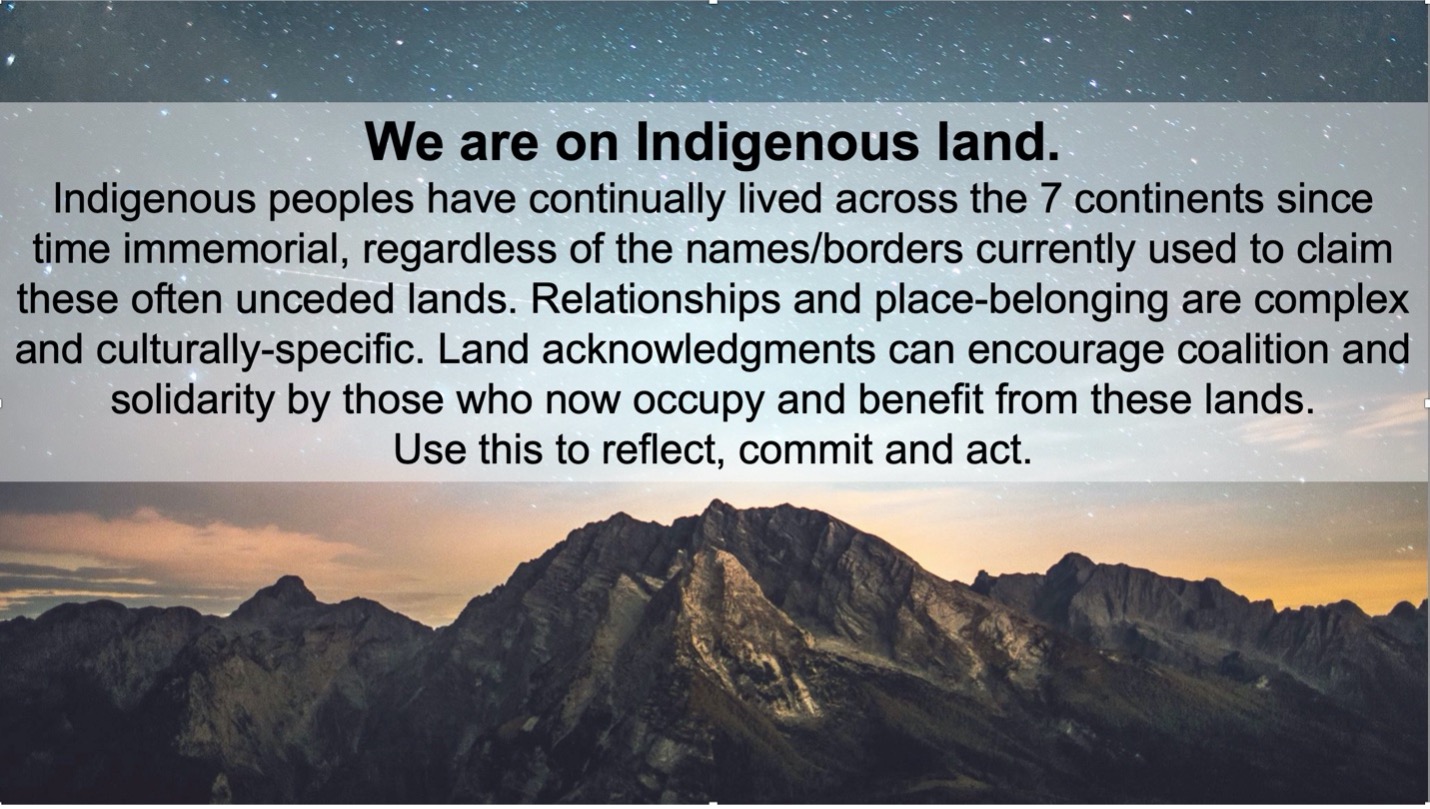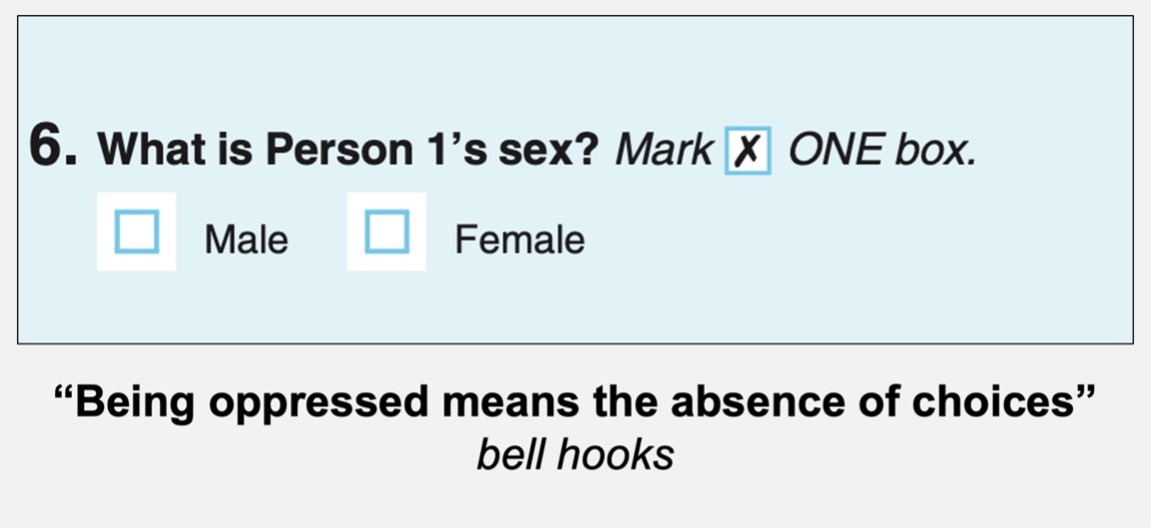Hello! We are Esrea Perez-Bill (she/her/they/them) with the EDIT Program at Northwestern University and Michael Petillo (he/him/they/them) with CES Partnership, LLC. We are emerging evaluators and creative researchers inviting you to coalition in radical solidarity with us against the othering/erasure of LGBTQ2S+ people (title invoking Gil Scott-Heron).

Learn about land acknowledgement and the Indigenous lands that you are on
Who determines who is “other?”
By definition, the “other” doesn’t meet the “standard.” But who and what defines that measurement? The evaluation “standard” is rooted in a settler-colonial, White, male, heteronormative, ciscentric, able-bodied, Western science paradigm. Rigid State surveillance systems rely on simplification and assimilation when faced with complexity/diversity, like the U.S. Census 2020 binary sex question. Why? Identities outside of settler-colonial-defined “civilized sexualities” are read as excess or dangerous, necessitating erasure that misrecognizes the multiplicity of LGBTQ+ and Two-Spirit peoples.

Photo of U.S. Census 2020 Question 6
“Othering” results in erasure.
Statecraft can use oppression/violence against “othered” bodies deemed “consumable” and thus erasable or “non-grievable” to develop/enforce State systems. Police violence against Black, trans, and gender non-conforming peoples criminalizes them, which encourages anti-LGBT state bills “for protection.” Aware of this vulnerability, survey participants’ non-responsiveness can represent statecraft resistance/self-protection from becoming a publicly “othered” body (spectacle), something that evaluators who assume “there aren’t any queer or TGNB people here” miss. An “other” category, such as driver’s licenses’ third “X” gender options, still forces assimilation through politics of respectability and still misaligns with normative binary systems, such as prisons.
Investment in decolonized evaluation requires changing how we read/understand diverse bodies, including an LGBTQ2S+ inclusive paradigm shift. Reframing social justice evaluation through radical accompliceship/co-conspiracy with LGBTQ2S+ people creates space for multifaceted liberation and self-authorship and practicing mutual aid.
Lesson to Learn:
Beware of State surveillance and LGBTQ+ oppression disguised as reform. A case study is the prison industrial complex, which disproportionately incarcerates Black, Brown, Indigenous, Latinx, and LGBTQ2S+ folks. Carceral state logic informs popular prison/policing alternatives, such as electronic monitoring, mental health and substance ab/use facilities, and sex work diversion programs that oppress LGBTQ+ and BIPOC peoples. Adopting a philosophy of abolition pushes us not only to reject and dismantle harmful systems, but to build in their place a loving, healthy, supportive world.
Cool Tricks:
- Don’t be cool. Be a co-conspirator.
- Question evaluator (and evaluand) biases when engaging sex, sexual orientation, and gender identity in demographic data
- Join the collective shift to resist harm/violences targeting LGBTQ2S+ communities.
- Center abolition and shared liberation within social justice evaluation.
- “Solidarity is Not Charity.” Think beyond the philanthropic industrial complex. Redistribute evaluation resources.
Call to Action:
Commit to 3 Actions over the next year. Here are some ideas:
- Find ways to support local LGBTQ2S+ organizations, community organizers, and individuals.
- Read up on LGBTQ2S+ evaluation! Select a number of books, articles, podcasts, or webinars. Start a reading/viewing group.
- Learn at least 1 new anti-oppressive framework that you can apply to your evaluation work.
How can we divest from State surveillance/oppression, and invest in LGBTQ2S+ communities?
How can we show up for LGBTQ2S+ communities every day?
The American Evaluation Association is celebrating LGBT TIG Week with our colleagues in the Lesbian, Gay, Bisexual & Transgender Issues Topical Interest Group. The contributions all this week to aea365 come from our LGBT TIG members. Do you have questions, concerns, kudos, or content to extend this aea365 contribution? Please add them in the comments section for this post on the aea365 webpage so that we may enrich our community of practice. Would you like to submit an aea365 Tip? Please send a note of interest to aea365@eval.org. aea365 is sponsored by the American Evaluation Association and provides a Tip-a-Day by and for evaluators. The views and opinions expressed on the AEA365 blog are solely those of the original authors and other contributors. These views and opinions do not necessarily represent those of the American Evaluation Association, and/or any/all contributors to this site.

Hello Esrea and Michael,
Thank you for sharing your insights and knowledge in this article! I am a new graduate student in the Professional Master’s of Education program at Queen’s University. I previously wrote about Duaba Unenra’s article “What Could Evaluation Unencumbered by Whiteness Be Like?” and how it challenged my current thinking about program evaluation and how racism plays a part in it. I found your article in my search to expand my thinking even more.
I am currently completing a Program Evaluation Design of a social program in my province and the point you made about how the status quo relies on binaries that seek to invalidate those who identify out of the “ends” of a spectrum, really sat with me. What are we actually evaluating when we actively erase communities that are affected by the programs? How do our biases manifest in program evaluation and how can we hold each other accountable? How can we decolonized a process that is so heavily rooted in colonization and its successes?
In my project there is an onus on me to collect data that validates the children and caregivers involved. Declining survey responses could be attributed to the lack of choices available and the absence of those voices invalidate already marginalized groups within the community.
In an effort to be a co-conspirator, the calls to action that I have adopted for myself is to “question evaluator (and evaluand) biases when engaging sex, sexual, orientation, and gender identity in demographic data” and to read more about 2SLGBTQ+ organizations, community organizers, and individuals. I am new to the field of program evaluation and I am pleased to see the anti-oppressive work that is being done here.
Thank you for your article and showing ways that I can show up for my 2SLGBTQ+ community!
Hi there,
Thanks so much for your thoughtful article. I’m an educator in Ontario, Canada, teaching Grades 1&2 French Immersion. I’ve been thinking a lot over the past year or so as to how I can decolonize my teaching practice. One seemingly small example that I’m working with is breaking the habit of saying
“girls and boys” in favour for “les amis” – friends. Furthermore, in the spring each year, our school and all schools in our city fill out what are called “pink and blue forms” for each student in order to place them into classes the following year. It’s ridiculous. At our last staff meeting last week, we literally had an hour of inclusivity training where we got really real about a lot of things from our biases to how our language affects the students, and then our VP moved on to class building – this year we were eliminating pink and blue forms and instead they were going to be orange and purple, or something. I popped in and was like wait wait wait, how did we just have an hour of inclusivity training and yet we’re still going to categorize our students by gender?! And what do we do about students who don’t conform or identify with these genders?? Thankfully, admin came back a few days later saying that we were eliminating the colour coded system.
Although this take comes from an education perspective moreso than an evaluation perspective, there is significant overlap as you can consider the teachers as the evaluators of these students. In the end it’s my belief that sex and gender shouldn’t matter when looking at a group of students, and classrooms with a healthy mix of “boys and girls” is an antiquated thought. My question is why, why do we need a healthy mix of girls and boys?? Some thoughts I will have to bring to admin in the future.
Would love to hear your thoughts!
Thanks,
Kristy
So powerful in so many ways! From the theoretical to the practical to the spiritual, this post is warrior writing!!! Ho-WAH (Indigenous shout out)! I deeply appreciate the calls to action and as straight, Indigenous, and Kwe (traditional woman) stand strongly by the side of LGBTG2S+ Relatives as well as behind them to support and hold whatever needs good medicine. I’m here to love, learn, unlearn, relearn, and braid in our collective emancipation and divesting from settler or other sponsored hate.